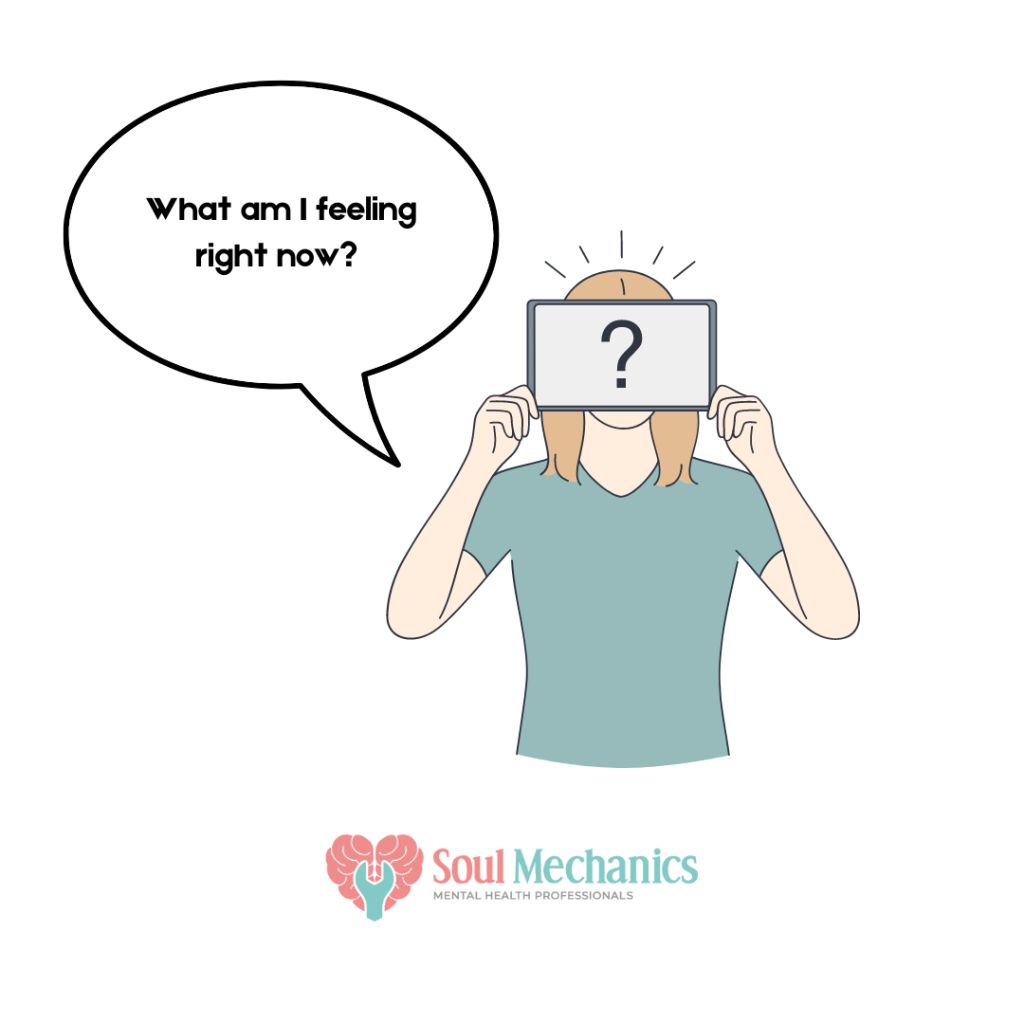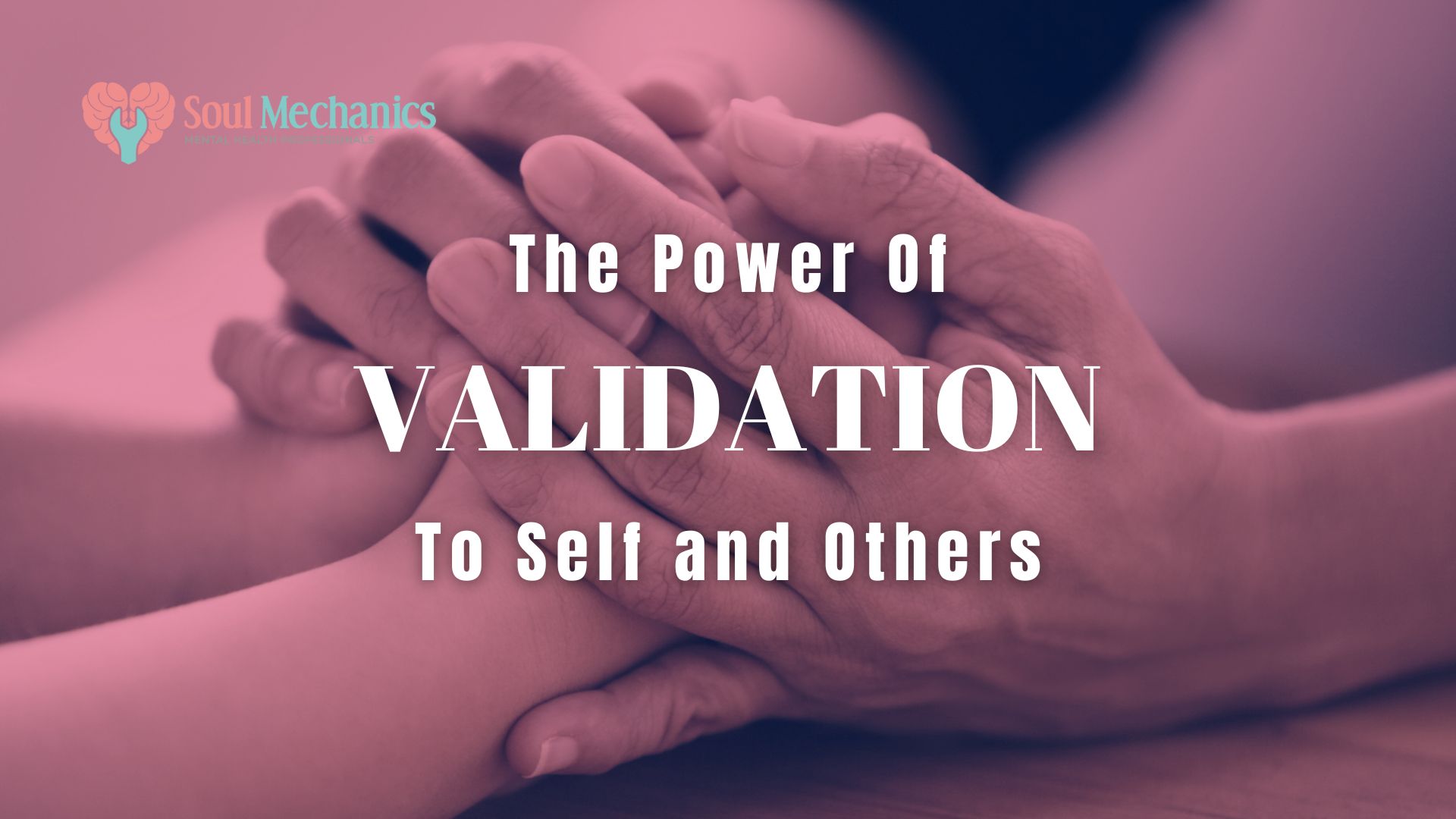The Power of Validation to Self and Others
The Power of Validation to Self and Others

Written By: Kelly Chan Jia Li, Clinical Psychologist (MAHPC(CP)00353)
We often hear about validation in conversations about mental health, personal growth, and interpersonal relationships. Whether we are validating ourselves or others, this act of validation can lead to stronger relationships, better mental health, and a more compassionate world. But what does it really mean, and why is it so important?
What is Validation?

Validation is the process of acknowledging and affirming one's feelings, thoughts, or experiences. It involves showing empathy, understanding, and acceptance of someone's emotional experience, even if you do not necessarily agree or share the same feelings.
For example, when a friend feels overwhelmed, validation could say, "I can see why you feel that way. It sounds like a lot to handle." This statement does not offer a solution or dismiss their feelings; instead, it acknowledges their emotional state and shows understanding. Validation meets the fundamental human need to feel seen, heard, and understood. When we feel validated, we experience a sense of connection and safety.
Validation can be directed both inward (towards ourselves) and outward (towards others). Self-validation is acknowledging and accepting our emotions and thoughts without harsh self-criticism. It is about being kind to ourselves and understanding that our feelings are valid, even if they are difficult or uncomfortable.

What are the Common Misconceptions about Validation?
Validation is Not an Agreement
Many mistakenly believe that validating someone's feelings means agreeing with them. However, you can validate someone's feelings without agreeing with their perspective or decisions. For instance, you might say, "I understand why you feel this way," without saying, "I think you are right."
Validation is Not a Problem-Solving Tool
Validation is about acknowledging feelings, not fixing problems. Sometimes, we tend to jump straight to offering solutions when someone shares their struggles. While well-intentioned, this can feel dismissive. Instead, focus on validating the emotion first: "It sounds like this is really tough for you."
Validation is Not Patronizing

True validation is sincere and empathetic. It is not about telling someone what they want to hear or minimizing their experiences with phrases like "I know how you feel" or "It could be worse."
Why Validating Others Matters?
Builds Emotional Connection with Others
When we validate others, we build a deeper emotional connection. It shows that we care about their feelings and experiences. This connection is essential in any relationship (e.g., friends, family, partner). For instance, if a friend is upset because they did not do well in a presentation, validating their feelings by saying, "It is okay to feel disappointed. You worked really hard for this," can help them feel understood and supported.

Reduces Emotional Distress

Sometimes, knowing that someone understands what we are going through can ease our pain. Validation can reduce emotional distress by helping individuals feel less alone in their struggles. For instance, if someone is grieving the loss of a loved one, hearing someone say, "Your grief is completely normal, and it is okay to take the time you need" can be incredibly comforting.
Encourages Healthy Communication
Validation encourages open and honest communication. When people feel safe expressing their feelings without fear of judgment, they are more likely to communicate effectively. This can prevent misunderstandings and conflicts in relationships. For example, in a romantic relationship, if one partner expresses feeling neglected, the other can validate their feelings by saying, "I understand why you feel that way, and I want to work on this together."
Why Self-Validation Matters?
Reduces Self-Criticism
Imagine you made a mistake at work, and your first reaction is to harshly criticize yourself by saying, "How could I mess this up?". Self-validation involves recognizing the mistake and responding with compassion by saying, "I made a mistake, but that does not define my worth. I can learn from this and do better next time." This shift in perspective reduces self-blame and forms a healthier relationship with ourselves.

Improves Emotional Regulation
When we validate our emotions, we acknowledge them without letting them take over. For instance, if you feel anxious before a presentation, instead of suppressing or beating yourself up for feeling anxiety, you might say, "It is okay to feel anxious. This is a big presentation, and feeling this way is natural." This allows the acceptance of emotion rather than intensifying it through resistance or denial.
Promotes Self-Acceptance
Self-validation is a key component of self-acceptance. By recognizing our feelings and experiences as valid, we embrace ourselves fully. It prevents the cycle of trying to "fix" ourselves to fit unrealistic standards and encourages a more fulfilling life.
What are the Challenges of Validation?

While validation is a powerful tool, it can be challenging to practice. Sometimes, we struggle to validate others because we do not fully understand or agree with their perspective. Similarly, self-validation can be difficult if we are used to being critical of ourselves.
How to Validate Others?
Practice Active Listening
Give the person your full attention. Instead of feeling the urge to offer solutions, show that you are fully present and engaged in what they are saying by nodding, making eye contact, and avoiding interrupting. Active listening forms the foundation of validation. You can say something like, "That sounds really tough. I am here for you."

Avoid Judgment and Criticism
Validation involves accepting feelings as they are. It is important not to judge or dismiss someone's feelings. Even if you think they are overreacting, remember that their feelings are real to them. Avoid saying things like, "You should not feel that way," or "That is not a big deal." These statements can invalidate their experiences and make them feel dismissed.
Reminder: If you or your loved ones are struggling with mental health concerns, please don't hesitate to reach out to us at Soul Mechanics KD or Soul Mechanics Ipoh. Remember, seeking help is not a sign of weakness but strength!
Use Empathetic Language

Empathy is at the heart of validation. You can show empathy by using language that reflects understanding and care. Use statements like, "That sounds really tough," or "I can understand why you would feel that way." These phrases show compassion and understanding, which helps them feel supported.
Validate the Emotion, Not Just the Content
Sometimes, it is not about the specific details but the emotions behind them. For example, if someone is upset because their favourite cafe closed down, you might say, "I know how much you loved that place. It must be disappointing to see it close." This response validates the emotion (i.e., disappointment) rather than focusing on the content (i.e., the cafe closing).
How to Do Self-Validation?
Acknowledge Your Emotions
The first step in self-validation is to acknowledge what you are feeling. Take a moment to check in with yourself and identify your emotions without any judgment. Are you feeling angry, sad, anxious, or happy?
Give Yourself Permission to Feel
Self-validation encourages you to experience your emotions fully. Remember that all emotions, even the uncomfortable ones, are a natural part of being human. Whatever you are feeling, give yourself permission to feel it. Instead of saying, "I should not feel this way," try saying, "I am feeling angry right now, and that is okay."

Understand the Source of Your Emotions

Once you have identified your emotions, try to understand where they are coming from. Reflect on the situation or thought that triggered these feelings. Understanding the source can help you see that your emotions are valid responses to your experiences.
Avoid Judging Your Feelings
There are no "right" or "wrong" emotions. All feelings are valid, and it is okay to feel them. Avoid labelling your feelings as good or bad. Instead, try to accept them as they are. For instance, instead of saying, "Jealousy is an ugly emotion," try saying, "I am feeling jealous, but that does not make me a bad person. It is an emotion, and it is okay to feel it."
Speak to Yourself with Compassion
Remind yourself that it is okay to have flaws and make mistakes. No one is perfect, and you deserve to be kind to yourself. Use kind and supportive language instead of harsh or critical self-talk. Instead of saying, "I am a failure for making the mistake," try saying, "I made a mistake, and that is okay. I am learning."
Practice Mindfulness
Mindfulness involves being present in the moment and observing your thoughts and feelings without judgment. Mindfulness creates a space where you acknowledge your emotions without becoming overwhelmed by them.

Try this exercise: Take a few deep breaths and say to yourself, "I am noticing that I am feeling [your emotion] right now. I am just going to breathe and let this feeling be here."
Validation May be Your New Friend

The power of validation lies in its ability to make people feel seen, heard, and valued. Whether we are validating others or ourselves, this simple act can lead to stronger relationships, better mental health, and a more compassionate world.
By practising validation, we can create a more supportive and understanding environment for everyone, including ourselves. Remember, validation is not about agreeing with everything someone says or feels; it is about recognizing that their emotions are valid. In a world where everyone wants to be heard and understood, validation is a gift that we can all give and receive to have a more fulfilled life.
If you enjoyed reading this, why not broaden the horizon of knowledge by learning about "Guilt and Shame Management: Breaking Free Tips"? You can read the blog here.
For more content related to mental health do follow us on our official Instagram.

